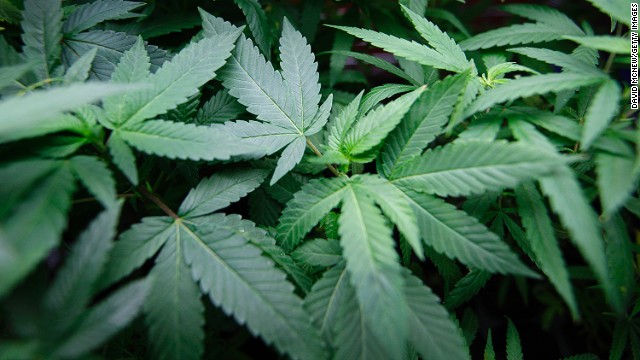 There appears to be a shift in the United States in favor of relaxing marijuana laws, a topic that has dipped in and out of the national conversation for decades. Public perceptions about pot have come a long way, from the dire warnings of "Reefer Madness" to growing acceptance of medical marijuana.
There appears to be a shift in the United States in favor of relaxing marijuana laws, a topic that has dipped in and out of the national conversation for decades. Public perceptions about pot have come a long way, from the dire warnings of "Reefer Madness" to growing acceptance of medical marijuana. 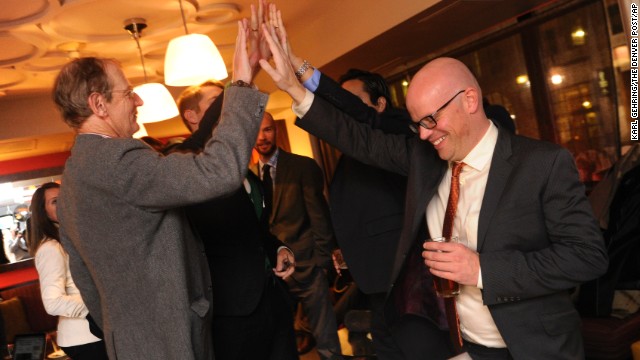 Rick Ridder, left, high-fives Christian Sederberg at a victory party in downtown Denver. Advocates for Proposition AA celebrated on Tuesday, November 5, after The Associated Press and the Denver Post called the vote in their favor. Proposition AA would impose a pair of taxes on legal marijuana sales.
Rick Ridder, left, high-fives Christian Sederberg at a victory party in downtown Denver. Advocates for Proposition AA celebrated on Tuesday, November 5, after The Associated Press and the Denver Post called the vote in their favor. Proposition AA would impose a pair of taxes on legal marijuana sales. 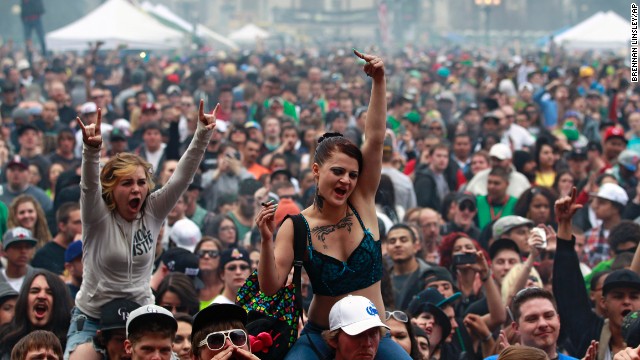 Members of a crowd numbering tens of thousands smoke and listen to live music at the Denver 420 Rally on April 20. Annual festivals celebrating marijuana are held around the world on April 20, a counterculture holiday.
Members of a crowd numbering tens of thousands smoke and listen to live music at the Denver 420 Rally on April 20. Annual festivals celebrating marijuana are held around the world on April 20, a counterculture holiday. 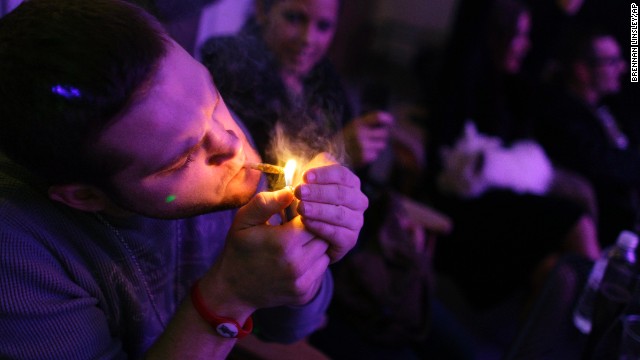 A man smokes a joint during the official opening night of Club 64, a marijuana social club in Denver, on New Year's Eve 2012. Voters in Colorado and Washington state passed referendums to legalize recreational marijuana on November 6, 2012.
A man smokes a joint during the official opening night of Club 64, a marijuana social club in Denver, on New Year's Eve 2012. Voters in Colorado and Washington state passed referendums to legalize recreational marijuana on November 6, 2012. 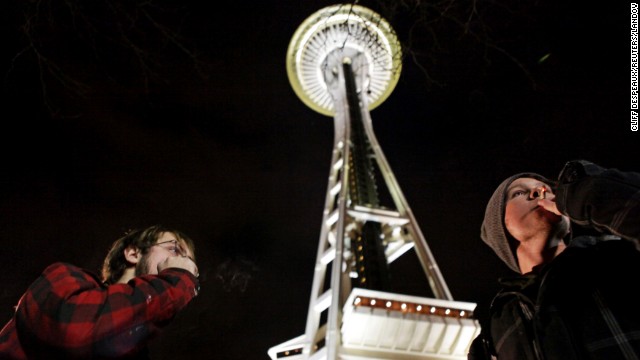 People light up near the Space Needle in Seattle after the law legalizing the recreational use of marijuana went into effect in Washington on December 6, 2012.
People light up near the Space Needle in Seattle after the law legalizing the recreational use of marijuana went into effect in Washington on December 6, 2012. 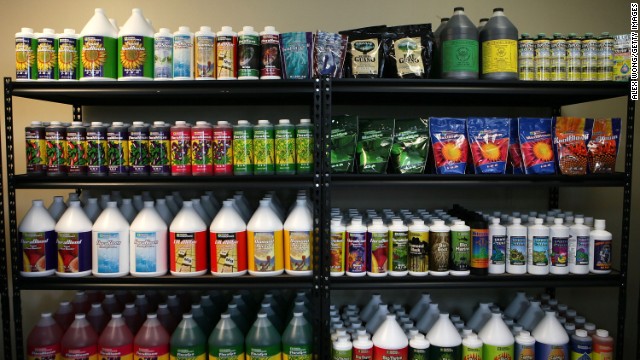 Nutrient products are placed on shelves in the weGrow marijuana cultivation supply store during its grand opening on March 30, 2012, in Washington, D.C. The store is a one-stop-shop for supplies and training to grow plants indoors, except for the actual marijuana plants or seeds. Legislation was enacted in 2010 authorizing the establishment of regulated medical marijuana dispensaries in the nation's capital.
Nutrient products are placed on shelves in the weGrow marijuana cultivation supply store during its grand opening on March 30, 2012, in Washington, D.C. The store is a one-stop-shop for supplies and training to grow plants indoors, except for the actual marijuana plants or seeds. Legislation was enacted in 2010 authorizing the establishment of regulated medical marijuana dispensaries in the nation's capital. 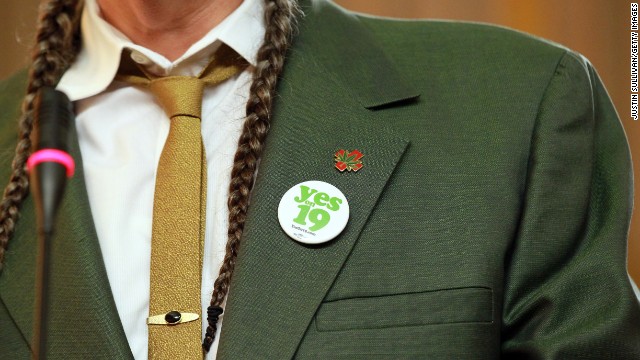 Marijuana activist Steve DeAngelo wears a "Yes on Prop 19" button as he speaks during a news conference in Oakland, California, on October 12, 2010, to bring attention to the state measure to legalize marijuana for recreational purposes in California. Voters rejected the proposal.
Marijuana activist Steve DeAngelo wears a "Yes on Prop 19" button as he speaks during a news conference in Oakland, California, on October 12, 2010, to bring attention to the state measure to legalize marijuana for recreational purposes in California. Voters rejected the proposal. 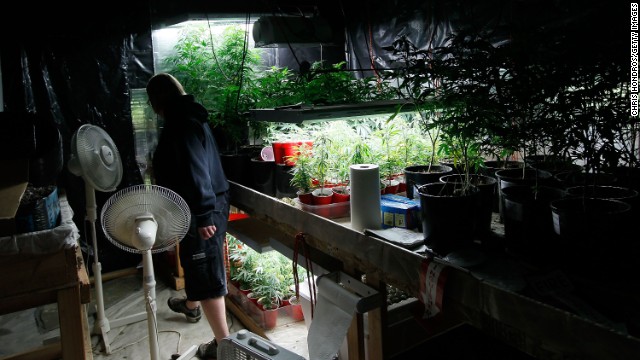 Sonja Gibbins walks through her growing warehouse in Fort Collins, Colorado, on April 19, 2010. Since the state approved medical marijuana in 2000, Colorado has seen a boom in marijuana dispensaries, trade shows and related businesses. So far 20 states and the District of Columbia have made smoking marijuana for medical purposes legal.
Sonja Gibbins walks through her growing warehouse in Fort Collins, Colorado, on April 19, 2010. Since the state approved medical marijuana in 2000, Colorado has seen a boom in marijuana dispensaries, trade shows and related businesses. So far 20 states and the District of Columbia have made smoking marijuana for medical purposes legal. 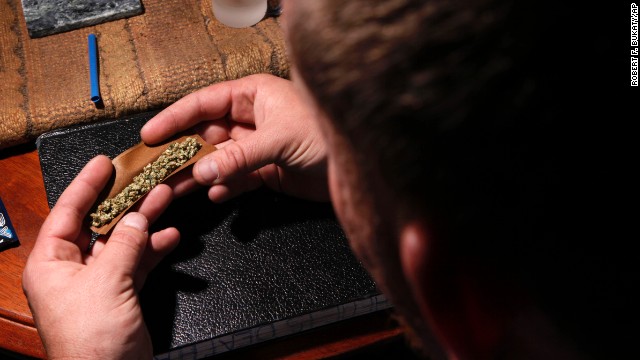 A patient prepares to smoke at home in Portland, Maine, on October 22, 2009, a decade after the state approved a medical marijuana referendum.
A patient prepares to smoke at home in Portland, Maine, on October 22, 2009, a decade after the state approved a medical marijuana referendum. 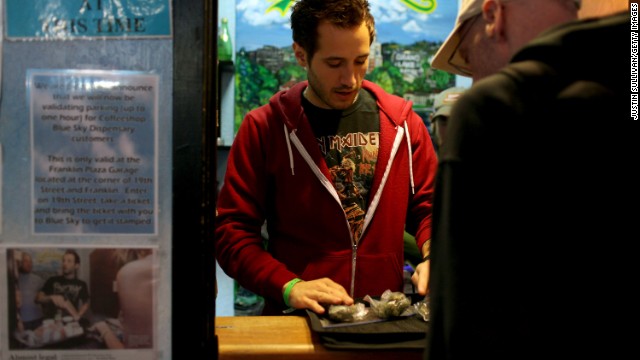 Coffeeshop Blue Sky worker Jon Sarro, left, shows a customer different strains of medical marijuana on July 22, 2009, in Oakland, California. Voters in the city approved a measure during a vote-by-mail special election for a new tax on sales of medicinal marijuana at cannabis dispensaries.
Coffeeshop Blue Sky worker Jon Sarro, left, shows a customer different strains of medical marijuana on July 22, 2009, in Oakland, California. Voters in the city approved a measure during a vote-by-mail special election for a new tax on sales of medicinal marijuana at cannabis dispensaries. 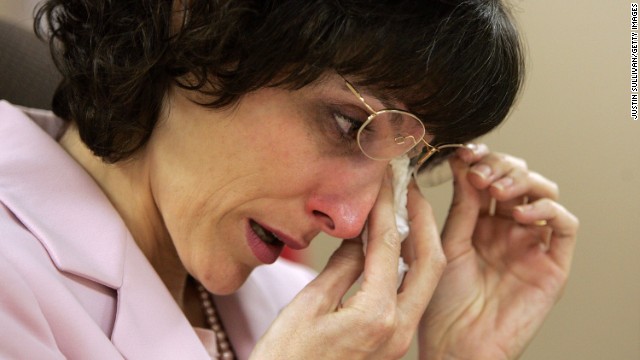 Medicinal marijuana patient Angel Raich wipes her eyes during a press conference on March 14, 2007, in Oakland, California. The 9th circuit U.S. Court of Appeals in San Francisco ruled that 41-year-old Raich, who used medicinal marijuana to curb pain from a brain tumor as well as other ailments, did not have the legal right to claim medical necessity to avoid the possibility of prosecution under federal drug laws.
Medicinal marijuana patient Angel Raich wipes her eyes during a press conference on March 14, 2007, in Oakland, California. The 9th circuit U.S. Court of Appeals in San Francisco ruled that 41-year-old Raich, who used medicinal marijuana to curb pain from a brain tumor as well as other ailments, did not have the legal right to claim medical necessity to avoid the possibility of prosecution under federal drug laws. 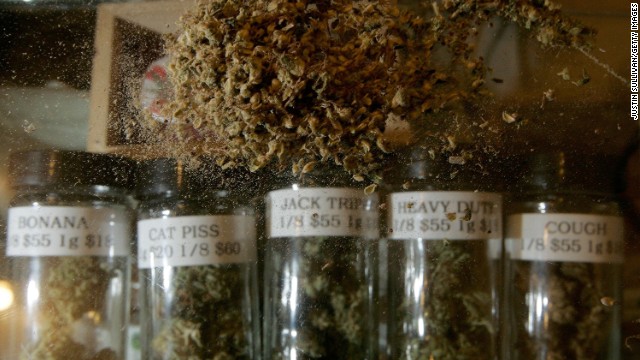 Different varieties of medical marijuana are seen at the Alternative Herbal Health Services cannabis dispensary in San Francisco on April 24, 2006. The Food and Drug Administration issued a controversial statement a week earlier rejecting the use of medical marijuana, declaring that there is no scientific evidence supporting use of the drug for medical treatment.
Different varieties of medical marijuana are seen at the Alternative Herbal Health Services cannabis dispensary in San Francisco on April 24, 2006. The Food and Drug Administration issued a controversial statement a week earlier rejecting the use of medical marijuana, declaring that there is no scientific evidence supporting use of the drug for medical treatment. 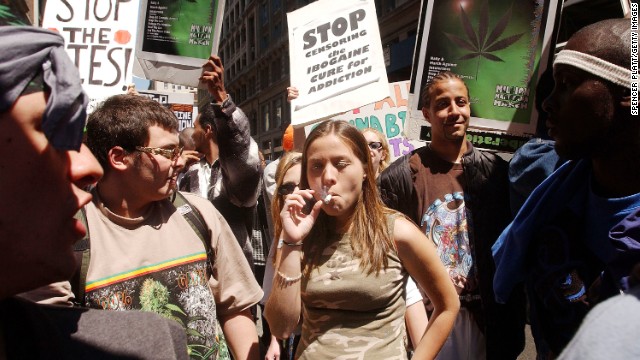 People in New York gather for a pro-cannabis rally on May 4, 2002. That same day, almost 200 similar events took place around the world to advocate for marijuana legalization. It was dubbed the "Million Marijuana March."
People in New York gather for a pro-cannabis rally on May 4, 2002. That same day, almost 200 similar events took place around the world to advocate for marijuana legalization. It was dubbed the "Million Marijuana March." 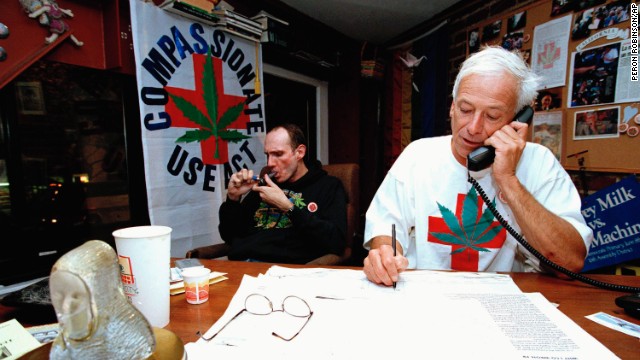 Dennis Peron takes notes during a phone interview while Gary Johnson lights up at the Proposition 215 headquarters in San Francisco on October 11, 1996. The ballot measure was approved when voters went to the polls in November, allowing medical marijuana in California.
Dennis Peron takes notes during a phone interview while Gary Johnson lights up at the Proposition 215 headquarters in San Francisco on October 11, 1996. The ballot measure was approved when voters went to the polls in November, allowing medical marijuana in California. 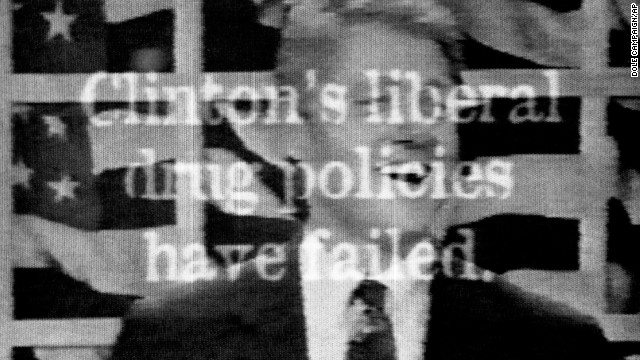 A television ad aired in 1996 by Republican presidential candidate Bob Dole's campaign included footage from a 1992 MTV interview of a laughing President Clinton saying he would inhale marijuana if given the chance to relive his college days.
A television ad aired in 1996 by Republican presidential candidate Bob Dole's campaign included footage from a 1992 MTV interview of a laughing President Clinton saying he would inhale marijuana if given the chance to relive his college days. 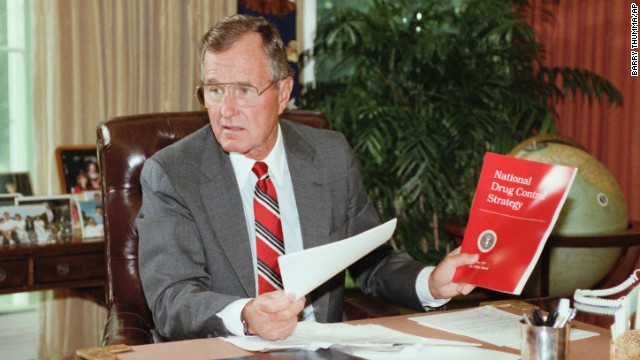 President George H. Bush holds up a copy of the National Drug Control Strategy during a meeting in the Oval Office on September 5, 1989. In a televised address to the nation, Bush asked Americans to join the war on drugs.
President George H. Bush holds up a copy of the National Drug Control Strategy during a meeting in the Oval Office on September 5, 1989. In a televised address to the nation, Bush asked Americans to join the war on drugs. 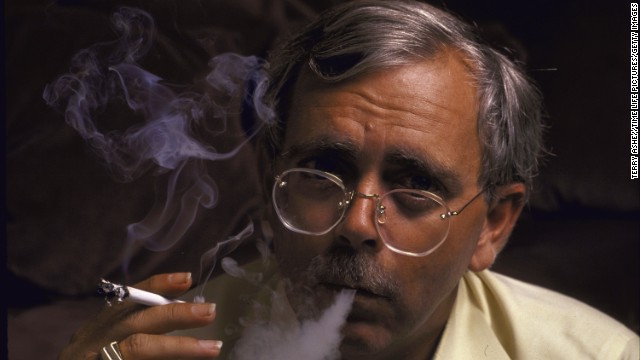 Robert Randall smokes marijuana that was prescribed to treat his glaucoma in 1988. He became the first legal medical marijuana patient in modern America after winning a landmark case in 1976.
Robert Randall smokes marijuana that was prescribed to treat his glaucoma in 1988. He became the first legal medical marijuana patient in modern America after winning a landmark case in 1976. 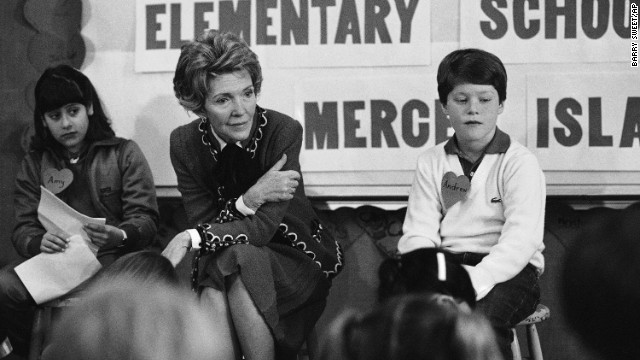 First lady Nancy Reagan participates in a drug education class at Island Park Elementary School on Mercer Island, Washington, on February 14, 1984. She later recalled, "A little girl raised her hand and said, 'Mrs. Reagan, what do you do if somebody offers you drugs?' And I said, 'Well, you just say no.' And there it was born." She became known for her involvement in the "Just Say No" campaign.
First lady Nancy Reagan participates in a drug education class at Island Park Elementary School on Mercer Island, Washington, on February 14, 1984. She later recalled, "A little girl raised her hand and said, 'Mrs. Reagan, what do you do if somebody offers you drugs?' And I said, 'Well, you just say no.' And there it was born." She became known for her involvement in the "Just Say No" campaign. 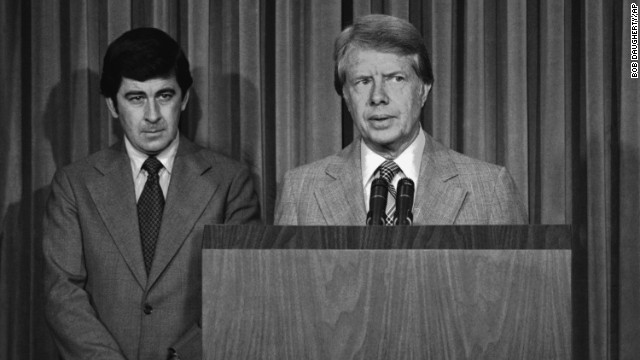 President Jimmy Carter, with his special assistant for health issues, Dr. Peter Bourne, beside him, talks to reporters at the White House about his drug abuse control message to Congress on August 2, 1977. Among other things, he called for the elimination of all federal criminal penalties for the possession of up to one ounce of marijuana.
President Jimmy Carter, with his special assistant for health issues, Dr. Peter Bourne, beside him, talks to reporters at the White House about his drug abuse control message to Congress on August 2, 1977. Among other things, he called for the elimination of all federal criminal penalties for the possession of up to one ounce of marijuana. 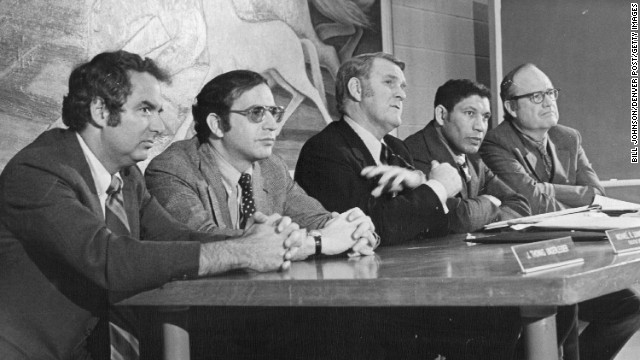 Panel members of the National Commission on Marijuana and Drug Abuse attend a hearing In Denver on January 10, 1972. From left, Dr. J. Thomas Ungerleider, psychiatrist; Michael R. Sonnenreich, commission executive director; Raymond P. Shafer, commission chairman; Mitchell Ware, Chicago attorney; Charles O. Galvin, Dallas law school dean. The commission's findings favored ending marijuana prohibition and adopting other methods to discourage use, but the Nixon administration refused to implement its recommendations.
Panel members of the National Commission on Marijuana and Drug Abuse attend a hearing In Denver on January 10, 1972. From left, Dr. J. Thomas Ungerleider, psychiatrist; Michael R. Sonnenreich, commission executive director; Raymond P. Shafer, commission chairman; Mitchell Ware, Chicago attorney; Charles O. Galvin, Dallas law school dean. The commission's findings favored ending marijuana prohibition and adopting other methods to discourage use, but the Nixon administration refused to implement its recommendations. 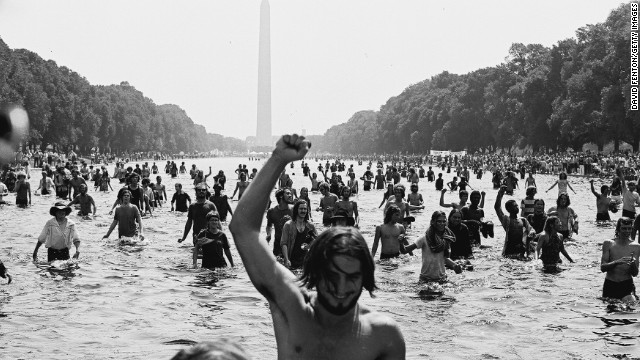 Protesters wade in the Reflecting Pool at the National Mall in Washington during the "Honor America Day Smoke-In" thrown by marijuana activists in response to the official "Honor America Day" rally organized by President Nixon supporters at the Lincoln Memorial on July 4, 1970.
Protesters wade in the Reflecting Pool at the National Mall in Washington during the "Honor America Day Smoke-In" thrown by marijuana activists in response to the official "Honor America Day" rally organized by President Nixon supporters at the Lincoln Memorial on July 4, 1970. 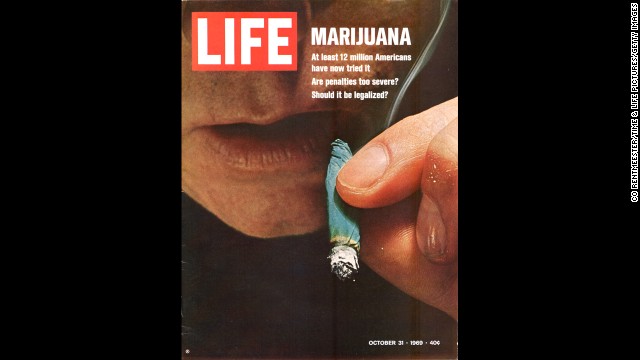 Marijuana reform was the Life magazine cover story in October 1969. The banner read: "At least 12 million Americans have now tried it. Are penalties too severe? Should it be legalized?"
Marijuana reform was the Life magazine cover story in October 1969. The banner read: "At least 12 million Americans have now tried it. Are penalties too severe? Should it be legalized?" 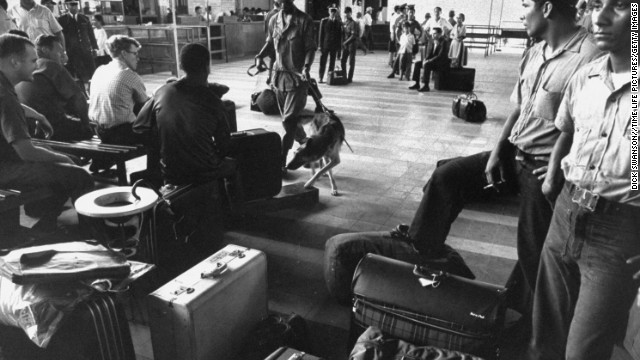 Police dogs trained to smell out hidden marijuana examine U.S. soldiers' luggage at the airport during the Vietnam War in 1969. Drug use was widespread during the war.
Police dogs trained to smell out hidden marijuana examine U.S. soldiers' luggage at the airport during the Vietnam War in 1969. Drug use was widespread during the war. 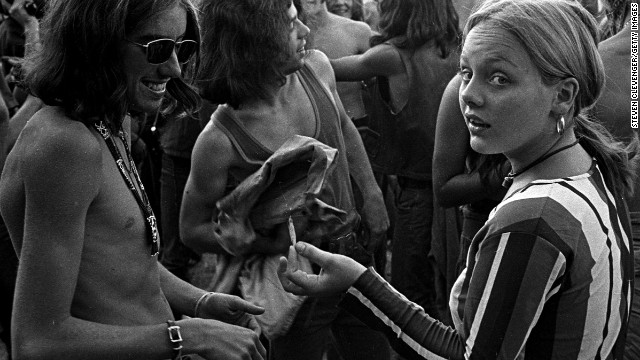 People share a joint during a 1969 concert in Portland, Oregon. In 1973, Oregon became the first state to decriminalize cannabis.
People share a joint during a 1969 concert in Portland, Oregon. In 1973, Oregon became the first state to decriminalize cannabis. 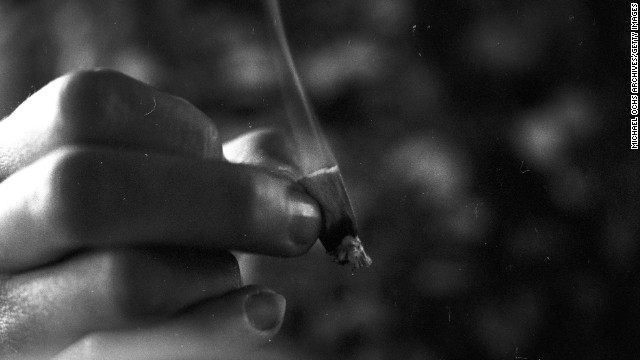 Marijuana use became more widespread in the 1960s, reflecting the rising counterculture movement.
Marijuana use became more widespread in the 1960s, reflecting the rising counterculture movement. 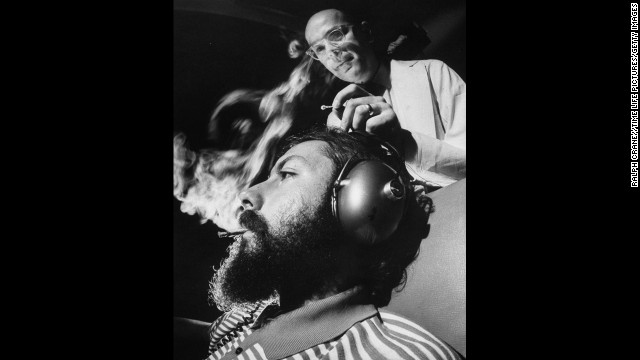 Research scientist Dr. Reese T. Jones, right, adjusts the electrodes monitoring a volunteer's brain response to sound during an experiment in 1969 that used a controlled dosage of marijuana. The tests were conducted at the Langley Porter Institute at the University of California, San Francisco.
Research scientist Dr. Reese T. Jones, right, adjusts the electrodes monitoring a volunteer's brain response to sound during an experiment in 1969 that used a controlled dosage of marijuana. The tests were conducted at the Langley Porter Institute at the University of California, San Francisco. 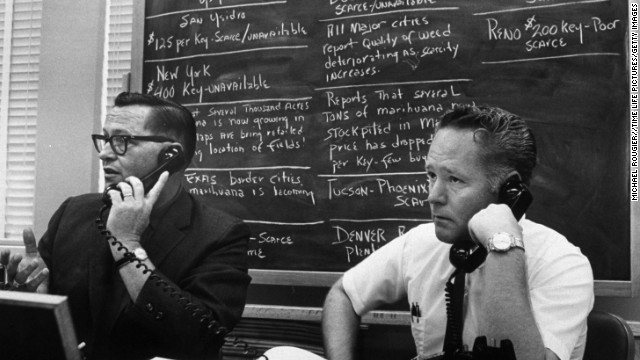 U.S. Customs agents track the nationwide marijuana market during Operation Intercept, an anti-drug measure announced by President Nixon in 1969. The initiative intended to keep Mexican marijuana from entering the United States.
U.S. Customs agents track the nationwide marijuana market during Operation Intercept, an anti-drug measure announced by President Nixon in 1969. The initiative intended to keep Mexican marijuana from entering the United States. 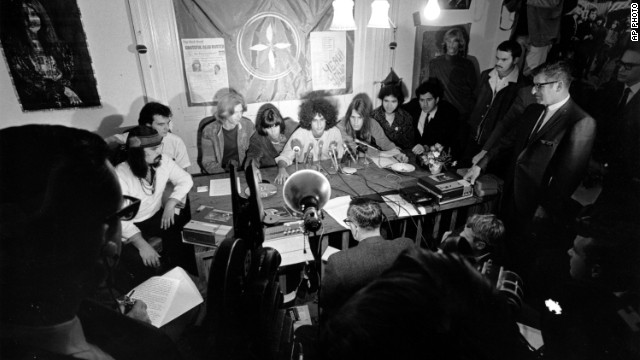 Members of the Grateful Dead talk with reporters from their home in San Francisco on October 5, 1967. The band was protesting being arrested for marijuana possession.
Members of the Grateful Dead talk with reporters from their home in San Francisco on October 5, 1967. The band was protesting being arrested for marijuana possession. 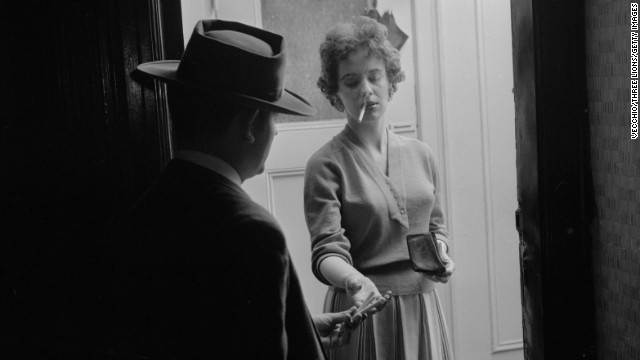 A woman buys ready-rolled marijuana cigarettes from a dealer at her door circa 1955.
A woman buys ready-rolled marijuana cigarettes from a dealer at her door circa 1955. 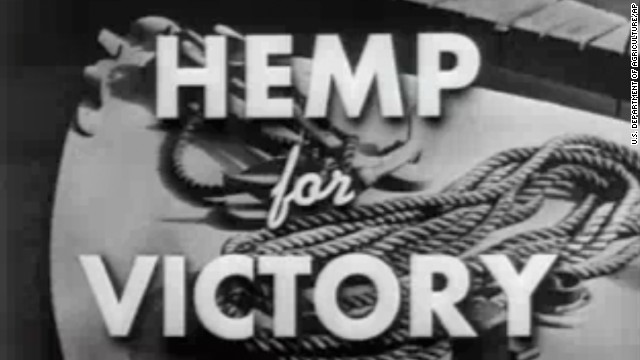 Even after Congress cracked down on marijuana in 1937, farmers were encouraged to grow the crop for rope, sails and parachutes during World War II. The "Hemp for Victory" film was released in 1942 by the U.S. Department of Agriculture.
Even after Congress cracked down on marijuana in 1937, farmers were encouraged to grow the crop for rope, sails and parachutes during World War II. The "Hemp for Victory" film was released in 1942 by the U.S. Department of Agriculture.  Marijuana cigarettes are hidden in a book circa 1940. Congress passed the Marijuana Tax Act in 1937, effectively criminalizing the drug.
Marijuana cigarettes are hidden in a book circa 1940. Congress passed the Marijuana Tax Act in 1937, effectively criminalizing the drug. 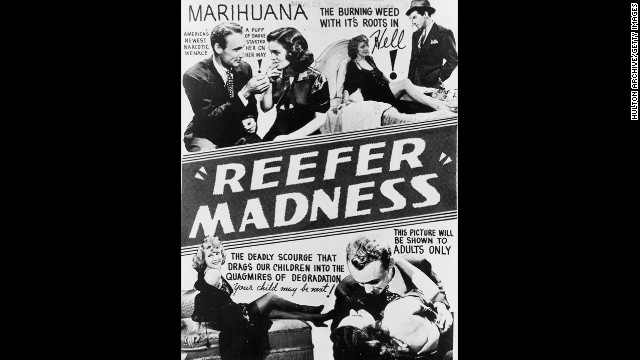 A poster advertises the 1936 scare film "Reefer Madness," which described marijuana as a "violent narcotic" that first renders "sudden, violent, uncontrollable laughter" on its users before "dangerous hallucinations" and then "acts of shocking violence ... ending often in incurable insanity."
A poster advertises the 1936 scare film "Reefer Madness," which described marijuana as a "violent narcotic" that first renders "sudden, violent, uncontrollable laughter" on its users before "dangerous hallucinations" and then "acts of shocking violence ... ending often in incurable insanity." 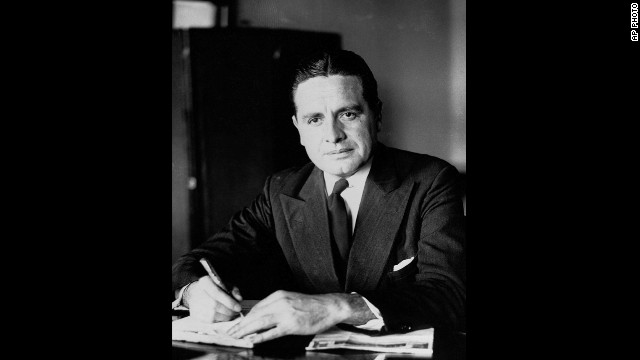 Harry Anslinger was named commissioner of the Federal Bureau of Narcotics when it was established in 1930. While arguing for marijuana prohibition, he played on Americans' fear of crime and foreigners. He spun tales of people driven to insanity or murder after ingesting the drug and spoke of the 2 to 3 tons of grass being produced in Mexico. "This, the Mexicans make into cigarettes, which they sell at two for 25 cents, mostly to white high school students," Anslinger told Congress.
Harry Anslinger was named commissioner of the Federal Bureau of Narcotics when it was established in 1930. While arguing for marijuana prohibition, he played on Americans' fear of crime and foreigners. He spun tales of people driven to insanity or murder after ingesting the drug and spoke of the 2 to 3 tons of grass being produced in Mexico. "This, the Mexicans make into cigarettes, which they sell at two for 25 cents, mostly to white high school students," Anslinger told Congress.
- 2014 is the year the nation starts to experiment with legal marijuana, John Hudak says
- He writes that other states will watch what happens in Colorado, Washington closely
- Hudak: Organized advocacy groups took debate out of dorm room to policy makers
- He says groups will help states with implementation, crucial for success
Editor's note: John Hudak is a fellow in governance studies at the Brookings Institution and the managing editor of the FixGov Blog. He is the author of the forthcoming book "Presidential Pork: White House Influence Over the Distribution of Federal Grants." Follow him on Twitter @JohnJHudak.
(CNN) -- The new year will be the year the nation really starts to experiment with marijuana.
It won't be the year legalization sweeps the country; it will be a year of wait and see. Indeed, 2014 will see the legalization movement gain greater political strength while facing the possibility of setbacks if the implementation of new laws fails.
It will also be a year of momentum-building. Advocacy groups will build on their recent ballot successes and work hard assisting implementation of new laws in Colorado and Washington. It may not be a flashy year; it may not be a headline-grabbing year, but it will be a critical year for the future of legalization advocacy.
In 2013, Washington and Colorado built the administrative infrastructure to ready their states for the legal sale of marijuana after successful 2012 ballot initiatives. Those initiatives were among the biggest victories to date for the legalization movement.
Of course, those successes didn't come about by accident. They were largely because legalization advocates -- over the course of many years -- transformed the movement into a mature, organized set of interest groups. These well-funded, expertly staffed groups showed themselves to be a political force with statewide ballot initiatives and increasingly in elections. Demonstrating the increasing acceptance of marijuana, the founder of a medical marijuana store, a respected businessman, was voted mayor of Sebastopol, California, last month.
Opinion: Finally, a nation legalizes pot
Statewide victories were complemented by local-level initiatives. Successes in places like Portland, Maine, and Lansing, Michigan, will probably generate greater energy in other cities, like Washington, that are considering legalization.
Building on this trend, groups will continue to develop as a politically savvy and powerful interest. In the world of lobbying, nothing breeds success (or raises funds) like prior success, and the past 14 months mean the movement will grow in numbers and financial capacity.
On a grass-roots level, organizations like NORML and the Marijuana Policy Project will continue to show people that support for legalization is no longer taboo. Instead, it is a serious issue that deals with public health, regulation, taxation and budgeting. These groups have done well to frame the issue not as a dorm-room debate but as a public policy problem. Those efforts pull supporters out of the shadows; they will continue in 2014.
In 2014, marijuana advocacy organizations will also continue to do something unheard of in today's American politics: unite Americans. This is one of the most remarkable, rarely discussed aspects of the movement. They don't just bring together like-minded Americans. They often bring together groups who normally bitterly oppose each other.
Liberals join hands with libertarians. Wealthy white voters who see marijuana laws as outdated join with non-white voters who see the enforcement of marijuana laws as discriminatory. Children of the 1960s join with their grandchildren who won't retire until even as late as the 2060s.
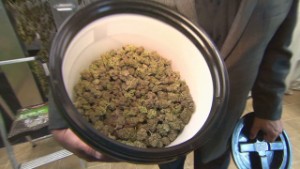 Colorado prepares for legal pot
Colorado prepares for legal pot 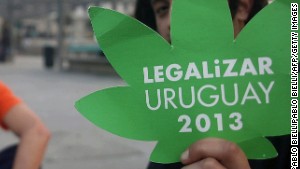 Uruguay decriminalizes pot
Uruguay decriminalizes pot 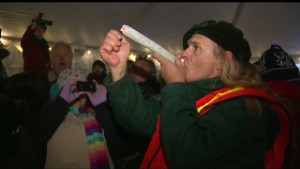 Seattle celebrates pot legalization
Seattle celebrates pot legalization On many issues, these groups have different views, but on legalization, many people find common ground. All those who think it should be legal to inhale may be the ones who breathe fresh air into American politics. They will produce policy solutions in a system that consistently fails to do anything of note.
The gains for supporters of legalization will be on display in 2014. But something else will happen behind the scenes this year that will be absolutely critical for the movement.
Advocates are planning statewide efforts, similar to those in Colorado and Washington. Organizations in places like Oregon and Massachusetts, among other states, are considering legalization ballot initiatives in the coming years. However, elected officials and voters may well take a wait-and-see approach. Colorado's and Washington's experiences will affect voters in future legalization efforts.
If those states have a positive experience with legalization -- dispelling opponents' concerns about addiction, traffic safety and crime --- and it adds to their budgets, others will be more open to legalization. Advocacy groups will face a flourishing political landscape.
If, however, the experiences in those states are negative -- implementation goes awry, programs become cost-inefficient or public health concerns arise -- the movement will stumble.
Advocates are not leaving that outcome to chance. In a show of how serious they are about legalization-as-public-policy, they are actively assisting states in implementation. If the movement will continue to succeed, it must be actively committed to making implementation work and work well. If the experience of the Affordable Care Act in 2013 has shown us anything, it is that implementation matters. Botched rollouts, unforeseen bumps in the road and other challenges hurt advocates and embolden opponents.
In this way, 2014 is the start of experimentation with marijuana. It might not be a flashy year for the movement or the opposition. But 10 years from now, legalization advocates may look back at this year and note that it was make or break for the movement, making 2014 one of the most crucial years for marijuana policy.
Follow us on Twitter @CNNOpinion
Join us on Facebook/CNNOpinion
The opinions expressed in this commentary are solely those of John Hudak.
via CNN.com - Top Stories http://rss.cnn.com/~r/rss/cnn_topstories/~3/_1vunKIgcn0/index.html
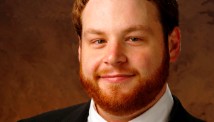
 Colorado prepares for legal pot
Colorado prepares for legal pot  Uruguay decriminalizes pot
Uruguay decriminalizes pot  Seattle celebrates pot legalization
Seattle celebrates pot legalization  There appears to be a shift in the United States in favor of relaxing marijuana laws, a topic that has dipped in and out of the national conversation for decades. Public perceptions about pot have come a long way, from the dire warnings of "Reefer Madness" to growing acceptance of medical marijuana.
There appears to be a shift in the United States in favor of relaxing marijuana laws, a topic that has dipped in and out of the national conversation for decades. Public perceptions about pot have come a long way, from the dire warnings of "Reefer Madness" to growing acceptance of medical marijuana.  Rick Ridder, left, high-fives Christian Sederberg at a victory party in downtown Denver. Advocates for Proposition AA celebrated on Tuesday, November 5, after The Associated Press and the Denver Post called the vote in their favor. Proposition AA would impose a pair of taxes on legal marijuana sales.
Rick Ridder, left, high-fives Christian Sederberg at a victory party in downtown Denver. Advocates for Proposition AA celebrated on Tuesday, November 5, after The Associated Press and the Denver Post called the vote in their favor. Proposition AA would impose a pair of taxes on legal marijuana sales.  Members of a crowd numbering tens of thousands smoke and listen to live music at the Denver 420 Rally on April 20.
Members of a crowd numbering tens of thousands smoke and listen to live music at the Denver 420 Rally on April 20.  A man smokes a joint during the official opening night of Club 64, a marijuana social club in Denver, on New Year's Eve 2012. Voters in
A man smokes a joint during the official opening night of Club 64, a marijuana social club in Denver, on New Year's Eve 2012. Voters in  People light up near the Space Needle in Seattle after the law legalizing the recreational use of marijuana went into effect in Washington on December 6, 2012.
People light up near the Space Needle in Seattle after the law legalizing the recreational use of marijuana went into effect in Washington on December 6, 2012.  Nutrient products are placed on shelves in the weGrow marijuana cultivation supply store during its grand opening on March 30, 2012, in Washington, D.C. The store is a one-stop-shop for supplies and training to grow plants indoors, except for the actual marijuana plants or seeds. Legislation was enacted in 2010 authorizing the establishment of regulated medical marijuana dispensaries in the nation's capital.
Nutrient products are placed on shelves in the weGrow marijuana cultivation supply store during its grand opening on March 30, 2012, in Washington, D.C. The store is a one-stop-shop for supplies and training to grow plants indoors, except for the actual marijuana plants or seeds. Legislation was enacted in 2010 authorizing the establishment of regulated medical marijuana dispensaries in the nation's capital.  Marijuana activist Steve DeAngelo wears a "Yes on Prop 19" button as he speaks during a news conference in Oakland, California, on October 12, 2010, to bring attention to the state measure to legalize marijuana for recreational purposes in California.
Marijuana activist Steve DeAngelo wears a "Yes on Prop 19" button as he speaks during a news conference in Oakland, California, on October 12, 2010, to bring attention to the state measure to legalize marijuana for recreational purposes in California.  Sonja Gibbins walks through her growing warehouse in Fort Collins, Colorado, on April 19, 2010. Since the state approved medical marijuana in 2000, Colorado has seen a boom in marijuana dispensaries, trade shows and related businesses. So far 20 states and the District of Columbia have made smoking marijuana for medical purposes legal.
Sonja Gibbins walks through her growing warehouse in Fort Collins, Colorado, on April 19, 2010. Since the state approved medical marijuana in 2000, Colorado has seen a boom in marijuana dispensaries, trade shows and related businesses. So far 20 states and the District of Columbia have made smoking marijuana for medical purposes legal.  A patient prepares to smoke at home in Portland, Maine, on October 22, 2009, a decade after the state approved a medical marijuana referendum.
A patient prepares to smoke at home in Portland, Maine, on October 22, 2009, a decade after the state approved a medical marijuana referendum.  Coffeeshop Blue Sky worker Jon Sarro, left, shows a customer different strains of medical marijuana on July 22, 2009, in Oakland, California. Voters in the city approved a measure during a vote-by-mail special election for a new tax on sales of medicinal marijuana at cannabis dispensaries.
Coffeeshop Blue Sky worker Jon Sarro, left, shows a customer different strains of medical marijuana on July 22, 2009, in Oakland, California. Voters in the city approved a measure during a vote-by-mail special election for a new tax on sales of medicinal marijuana at cannabis dispensaries.  Medicinal marijuana patient Angel Raich wipes her eyes during a press conference on March 14, 2007, in Oakland, California. The 9th circuit U.S. Court of Appeals in San Francisco ruled that 41-year-old Raich, who used medicinal marijuana to curb pain from a brain tumor as well as other ailments, did not have the legal right to claim medical necessity to avoid the possibility of prosecution under federal drug laws.
Medicinal marijuana patient Angel Raich wipes her eyes during a press conference on March 14, 2007, in Oakland, California. The 9th circuit U.S. Court of Appeals in San Francisco ruled that 41-year-old Raich, who used medicinal marijuana to curb pain from a brain tumor as well as other ailments, did not have the legal right to claim medical necessity to avoid the possibility of prosecution under federal drug laws.  Different varieties of medical marijuana are seen at the Alternative Herbal Health Services cannabis dispensary in San Francisco on April 24, 2006. The Food and Drug Administration issued a controversial statement a week earlier rejecting the use of medical marijuana, declaring that there is no scientific evidence supporting use of the drug for medical treatment.
Different varieties of medical marijuana are seen at the Alternative Herbal Health Services cannabis dispensary in San Francisco on April 24, 2006. The Food and Drug Administration issued a controversial statement a week earlier rejecting the use of medical marijuana, declaring that there is no scientific evidence supporting use of the drug for medical treatment.  People in New York gather for a pro-cannabis rally on May 4, 2002. That same day, almost 200 similar events took place around the world to advocate for marijuana legalization. It was dubbed the "Million Marijuana March."
People in New York gather for a pro-cannabis rally on May 4, 2002. That same day, almost 200 similar events took place around the world to advocate for marijuana legalization. It was dubbed the "Million Marijuana March."  Dennis Peron takes notes during a phone interview while Gary Johnson lights up at the Proposition 215 headquarters in San Francisco on October 11, 1996. The ballot measure was approved when voters went to the polls in November, allowing medical marijuana in California.
Dennis Peron takes notes during a phone interview while Gary Johnson lights up at the Proposition 215 headquarters in San Francisco on October 11, 1996. The ballot measure was approved when voters went to the polls in November, allowing medical marijuana in California.  A television ad aired in 1996 by Republican presidential candidate Bob Dole's campaign included footage from a 1992 MTV interview of a laughing President Clinton saying he would inhale marijuana if given the chance to relive his college days.
A television ad aired in 1996 by Republican presidential candidate Bob Dole's campaign included footage from a 1992 MTV interview of a laughing President Clinton saying he would inhale marijuana if given the chance to relive his college days.  President George H. Bush holds up a copy of the National Drug Control Strategy during a meeting in the Oval Office on September 5, 1989. In a televised address to the nation, Bush asked Americans to join the war on drugs.
President George H. Bush holds up a copy of the National Drug Control Strategy during a meeting in the Oval Office on September 5, 1989. In a televised address to the nation, Bush asked Americans to join the war on drugs.  Robert Randall smokes marijuana that was prescribed to treat his glaucoma in 1988. He became the first legal medical marijuana patient in modern America after winning a landmark case in 1976.
Robert Randall smokes marijuana that was prescribed to treat his glaucoma in 1988. He became the first legal medical marijuana patient in modern America after winning a landmark case in 1976.  First lady Nancy Reagan participates in a drug education class at Island Park Elementary School on Mercer Island, Washington, on February 14, 1984. She later recalled, "A little girl raised her hand and said, 'Mrs. Reagan, what do you do if somebody offers you drugs?' And I said, 'Well, you just say no.' And there it was born." She became known for her involvement in the "Just Say No" campaign.
First lady Nancy Reagan participates in a drug education class at Island Park Elementary School on Mercer Island, Washington, on February 14, 1984. She later recalled, "A little girl raised her hand and said, 'Mrs. Reagan, what do you do if somebody offers you drugs?' And I said, 'Well, you just say no.' And there it was born." She became known for her involvement in the "Just Say No" campaign.  President Jimmy Carter, with his special assistant for health issues, Dr. Peter Bourne, beside him, talks to reporters at the White House about his drug abuse control message to Congress on August 2, 1977. Among other things, he called for the elimination of all federal criminal penalties for the possession of up to one ounce of marijuana.
President Jimmy Carter, with his special assistant for health issues, Dr. Peter Bourne, beside him, talks to reporters at the White House about his drug abuse control message to Congress on August 2, 1977. Among other things, he called for the elimination of all federal criminal penalties for the possession of up to one ounce of marijuana.  Panel members of the National Commission on Marijuana and Drug Abuse attend a hearing In Denver on January 10, 1972. From left, Dr. J. Thomas Ungerleider, psychiatrist; Michael R. Sonnenreich, commission executive director; Raymond P. Shafer, commission chairman; Mitchell Ware, Chicago attorney; Charles O. Galvin, Dallas law school dean. The commission's findings favored ending marijuana prohibition and adopting other methods to discourage use, but the Nixon administration refused to implement its recommendations.
Panel members of the National Commission on Marijuana and Drug Abuse attend a hearing In Denver on January 10, 1972. From left, Dr. J. Thomas Ungerleider, psychiatrist; Michael R. Sonnenreich, commission executive director; Raymond P. Shafer, commission chairman; Mitchell Ware, Chicago attorney; Charles O. Galvin, Dallas law school dean. The commission's findings favored ending marijuana prohibition and adopting other methods to discourage use, but the Nixon administration refused to implement its recommendations.  Protesters wade in the Reflecting Pool at the National Mall in Washington during the "Honor America Day Smoke-In" thrown by marijuana activists in response to the official "Honor America Day" rally organized by President Nixon supporters at the Lincoln Memorial on July 4, 1970.
Protesters wade in the Reflecting Pool at the National Mall in Washington during the "Honor America Day Smoke-In" thrown by marijuana activists in response to the official "Honor America Day" rally organized by President Nixon supporters at the Lincoln Memorial on July 4, 1970.  Marijuana reform was the
Marijuana reform was the  Police dogs trained to smell out hidden marijuana examine U.S. soldiers' luggage at the airport during the Vietnam War in 1969. Drug use was widespread during the war.
Police dogs trained to smell out hidden marijuana examine U.S. soldiers' luggage at the airport during the Vietnam War in 1969. Drug use was widespread during the war.  People share a joint during a 1969 concert in Portland, Oregon. In 1973, Oregon became the first state to decriminalize cannabis.
People share a joint during a 1969 concert in Portland, Oregon. In 1973, Oregon became the first state to decriminalize cannabis.  Marijuana use became more widespread in the 1960s, reflecting the rising counterculture movement.
Marijuana use became more widespread in the 1960s, reflecting the rising counterculture movement.  Research scientist Dr. Reese T. Jones, right, adjusts the electrodes monitoring a volunteer's brain response to sound during an experiment in 1969 that used a controlled dosage of marijuana. The tests were conducted at the Langley Porter Institute at the University of California, San Francisco.
Research scientist Dr. Reese T. Jones, right, adjusts the electrodes monitoring a volunteer's brain response to sound during an experiment in 1969 that used a controlled dosage of marijuana. The tests were conducted at the Langley Porter Institute at the University of California, San Francisco.  U.S. Customs agents track the nationwide marijuana market during Operation Intercept, an anti-drug measure announced by President Nixon in 1969. The initiative intended to keep Mexican marijuana from entering the United States.
U.S. Customs agents track the nationwide marijuana market during Operation Intercept, an anti-drug measure announced by President Nixon in 1969. The initiative intended to keep Mexican marijuana from entering the United States.  Members of the Grateful Dead talk with reporters from their home in San Francisco on October 5, 1967. The band was protesting being arrested for marijuana possession.
Members of the Grateful Dead talk with reporters from their home in San Francisco on October 5, 1967. The band was protesting being arrested for marijuana possession.  A woman buys ready-rolled marijuana cigarettes from a dealer at her door circa 1955.
A woman buys ready-rolled marijuana cigarettes from a dealer at her door circa 1955.  Even after Congress cracked down on marijuana in 1937, farmers were encouraged to grow the crop for rope, sails and parachutes during World War II. The "Hemp for Victory" film was released in 1942 by the U.S. Department of Agriculture.
Even after Congress cracked down on marijuana in 1937, farmers were encouraged to grow the crop for rope, sails and parachutes during World War II. The "Hemp for Victory" film was released in 1942 by the U.S. Department of Agriculture.  Marijuana cigarettes are hidden in a book circa 1940. Congress passed the Marijuana Tax Act in 1937, effectively criminalizing the drug.
Marijuana cigarettes are hidden in a book circa 1940. Congress passed the Marijuana Tax Act in 1937, effectively criminalizing the drug.  A poster advertises the 1936 scare film "Reefer Madness," which described marijuana as a "violent narcotic" that first renders "sudden, violent, uncontrollable laughter" on its users before "dangerous hallucinations" and then "acts of shocking violence ... ending often in incurable insanity."
A poster advertises the 1936 scare film "Reefer Madness," which described marijuana as a "violent narcotic" that first renders "sudden, violent, uncontrollable laughter" on its users before "dangerous hallucinations" and then "acts of shocking violence ... ending often in incurable insanity."  Harry Anslinger was named commissioner of the Federal Bureau of Narcotics when it was established in 1930. While arguing for marijuana prohibition, he played on Americans' fear of crime and foreigners. He spun tales of people driven to insanity or murder after ingesting the drug and spoke of the 2 to 3 tons of grass being produced in Mexico. "This, the Mexicans make into cigarettes, which they sell at two for 25 cents, mostly to white high school students," Anslinger told Congress.
Harry Anslinger was named commissioner of the Federal Bureau of Narcotics when it was established in 1930. While arguing for marijuana prohibition, he played on Americans' fear of crime and foreigners. He spun tales of people driven to insanity or murder after ingesting the drug and spoke of the 2 to 3 tons of grass being produced in Mexico. "This, the Mexicans make into cigarettes, which they sell at two for 25 cents, mostly to white high school students," Anslinger told Congress. 
































No hay comentarios:
Publicar un comentario